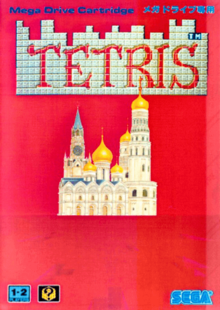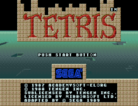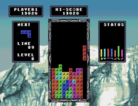Tetris (Mega Drive)
| Tetris | |
|---|---|
 | |
| Developer(s) | Sanritsu Denki[1] |
| Publisher(s) | Sega |
| Platform(s) | Mega Drive |
| Release | n/a |
| Gameplay info | |
| Next pieces | 1 (optional) |
| Playfield size | 10 × 20 (single-player) 12 × 20 (doubles) |
| Hold piece | No |
| Hard drop | Yes (automatic soft) |
| Rotation system | Sega rotation |
Tetris was a game for the Sega Mega Drive that was cancelled due to licensing issues.
The game was subsequently released on the Sega Mega-Tech, an arcade cabinet that played Mega Drive games. It was re-released as part of Sega Ages 2500 Series Vol. 28: Tetris Collection in 2006.
Gameplay
Soft drop is 1G. Drop button acts as an automatic soft drop, blocking all inputs until the piece locks. By pressing A, B or C on the pause screen, the high score display can be switched with a maximum lines display.
Modes
The game has two modes for single-player or simultaneous two-player play, and one cooperative two-player mode.
- Normal: A standard marathon mode.
- Time Trial: The game time is limited to 3 minutes. Otherwise, the mode plays the same as Normal.
- Doubles: A cooperative two-player mode on a single playfield.
Options
Controller options
Controller options are accessed by pressing A at the game's title screen.
- Direction: Reverse makes the D-pad directions upside-down (Left/Right reversed, Up for soft drop).
- Buttons: Choose between None, Rotate (counterclockwise), Reverse (clockwise) or Drop (automatic soft drop).
Gameplay options
- Level: Starting level (0 to 9).
- Height: Starting garbage (0, 4, 7, 10 or 13).
- Show next block: Preview option. This cannot be changed during gameplay.
- Use item blocks: See below for item effects.
Items
If item blocks are enabled, once every 10 pieces a special flashing piece will spawn. If the piece clears a line, the item's effect will activate. Each tetromino has a different item effect:
- L (Slow): Reduce level by 1.
- J (Fast): Increase level by 1.
- O (Extra): 200 point bonus.
- S (Bomb): Has different effects depending on whether the piece cleared a line or not:
- Line clear: The piece disappears with the line clear.
- No line clear: The piece remains flashing. After 10 seconds if any flashing blocks are still on the field they disappear.
- Z (Double): Double the points earned for the piece.
- T (Clear): Clears the rows containing the piece.
- I (Mystery): Chooses randomly from the other effects.
Scoring
The game's scoring is not based on the arcade version. Instead, it uses the following formula:
Score = Level × 3 + (Lowest row + Manual drop rows) × 2 + Line clear bonus
- Lowest row is the lowest row occupied by the piece when it locks, starting from 1 at the bottom row.
- As with the same year's Nintendo versions, the drop bonus is only awarded based on the press that leads to a lock. If the piece is not manually locked, the drop bonus is 0. It follows that if the piece is soft or hard dropped the piece's value depends only on the row where the manual drop started.
- Line clear bonus is as follows (independent of level):
| Single | 20 |
| Double | 50 |
| Triple | 120 |
| Tetris | 300 |
Development
The game was scheduled to be released on 15 April 1989, and was licensed through Tengen, who had also sold Bullet-Proof Software the rights for the Famicom. In March or April 1989 the game's release was postponed, then cancelled, of Sega's own volition after they heard of Nintendo's acquisition of the console licence.
After the game's cancellation, the copies that had been produced were destroyed. It is unknown how many copies survived; speculation ranges from "less than 10" to "one box" but there is no concrete evidence available. Genuine copies have been known to sell for over $16000. There are at least four known copies, two held by YouTuber Last Gamer,[2] one signed by Alexey Pajitnov which was listed on ebay for $1,000,000,[3] and one at the National Museum of Play in Rochester, NY.[4]
This became known as the "Tetris Incident" (テトリス事件) and contributed significantly to anti-Nintendo sentiment among Sega fans.[5]
References
- ↑ https://www.gamengai.com/#/cmnt-info?id=1436
- ↑ https://twitter.com/real_lastgamer/status/961021429515890688?lang=en
- ↑ http://www.gamesetwatch.com/2011/07/signed_genesis_tetris_auction_.php
- ↑ https://artsandculture.google.com/asset/video-game-sega-mega-drive-tetris-japanese-edition/XAE6kNPHjtCULA
- ↑ http://www7b.biglobe.ne.jp/~ninten-zatsugaku/tetlis.HTM
| |||||||||||

